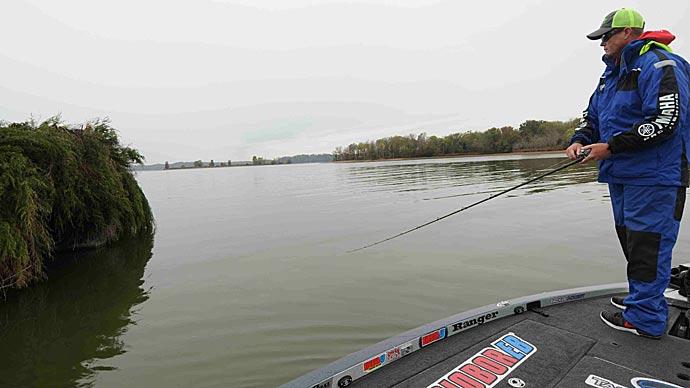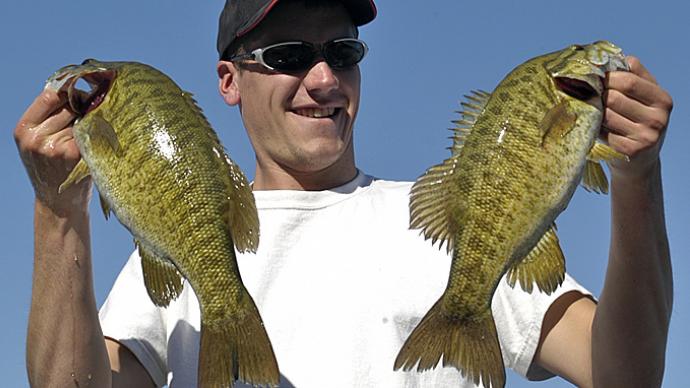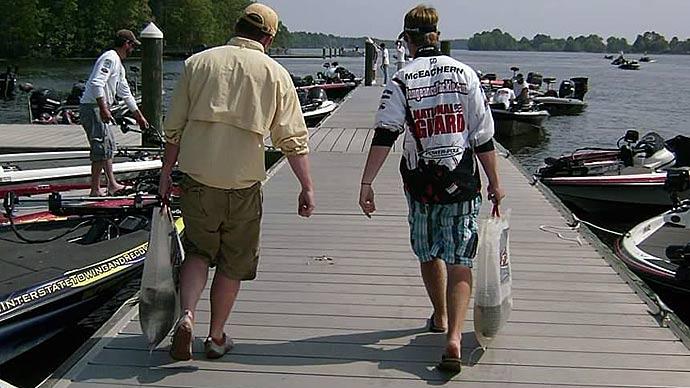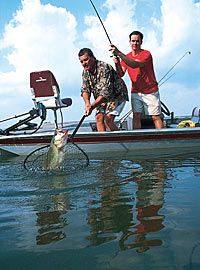
You are the new guy in the club, your first tournament is this Saturday, and all week long, you have fiddled with your tackle while second-guessing how your peers will receive you, a collection of hardcore bass anglers who have rightfully stereotyped you as the rookie.
On Friday night, you slip into the back of the room just as the club president begins the tournament briefing. Partner pairings are announced, and low and behold. You have drawn a hotshot who happens to be leading the club point standings.
After the formal introductions, you step outside to discuss plans for the next day with your partner, a respected angler you've never gone fishing with before. Then he pops the question you've been dreading all week: "You on fish?" You'll need to muster up the courage to answer with a no. After seeing a look of relief on his face, you calm down and proceed through the details for the following day. A meeting time and place are agreed upon, and then you go home, double-check your tackle, and get to bed, tossing and turning all night with anticipation.
The scenario above is repeated every year as bass fishing gains popularity and newcomers discover that joining a local club is the best way to connect with the sport.
Club tournaments are meant to be enjoyable learning experiences that enable newcomers to enjoy the fellowship of competition while helping them learn how to improve their fishing skills. As they gather experience, club rookies gain self-confidence and morph into veterans-but only if their peers accept them. If not, the feeling of betrayal will make them feel unwelcome, and they might quit the club.
Since there is no manual of tournament fishing etiquette available to club recruits, initiating them to the unwritten rules of the competition falls on the experienced members.
"Those of us who have been there and done it need to remind ourselves that part of the reason we belong to a club in the first place is the fellowship," noted Jimmy Kennedy, a former club state champion and tournament angler from Vermont. "The learning needs of the new guys can easily be overlooked, especially in the bigger clubs. And that is why it's essential to show them the ropes. Otherwise, they'll commit a blunder, not even know about it, and ruffle some feathers of the veterans."
Kennedy, who owns the River Run restaurant in Plainfield, also competes on the pro level, making him a qualified expert after having passed the rookie initiation at both levels. He offers the following tips for newcomers to bass club tournaments.
Don't Lie to Impress
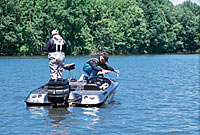
The first meeting leaves a considerable impression and sets the tone for the next day, says Kennedy. "You need to be as honest and upfront as possible. Otherwise, you might set false expectations the next day on the water that may never pan out. In that case, you both lose." Kennedy added that it is wise for rookies to let their partners mentor them for the first few events or until they have enough on-the-water confidence to take a partner.
He also says the initial meeting is when both partners should complete a mental checklist of what they will be responsible for the following day. The list should include everything from who is bringing the breakfast snacks to the lures and other related tackle to be used the next day.
"The last thing you need is the next morning to get out on the lake and find out you left something behind only because there was a misunderstanding in communication," Kennedy added.
After setting the meeting time and place, Kennedy suggests that the rookie drive the route from the boat ramp to his home if it's in unfamiliar territory. "It's a different world in the dark, and all you need to do is miss a turn because of being preoccupied with the day. Then you're late, which sends a bad message to your partner."
At the Launch Ramp
When setting a time and meeting place, be sure it's convenient for both parties. Most likely, the rookie assumes the role of a non-boater and should make a conscious effort to help his partner launch the boat and park the vehicle at the boat ramp.
The non-boater has an easy job when it comes down to launching the boat. However, he should also come fully prepared and not expect to take advantage of his boater.
"I don't know of any guys who won't share their gear with a new guy," Kennedy said. "But the non-boater should bring everything they need for that day, and that day only, when they are packing."
Today's tackle management systems are especially suited for non-boaters. Everything needed for a full day on the water can fit into one modular unit, including spare reels, line, and small tools. A waterproof duffel bag should be used for the extras, including a lunch, foul weather clothing, and minor odds and ends. Following that principle, the walk from the vehicle to the partner's boat should be made in one trip.
On the Lake
The excitement turns up a notch as the boat speeds down the lake to the first fishing spot of the day. As soon as the trolling motor is slipped into the water, the anticipation peaks as the first casts of the day are made to prime cover. Kennedy said this is when most rookies make their first mistakes. Neophytes also need to be keenly aware of "fishable" waters when fishing from the back of the boat. The basic idea is that the non-boater fishes behind the boater. The boater is the ship's captain, and rookies should adhere to this unspoken rule (or hear about it). Don't cast ahead of or even beside the tourney veteran. Give him some respect and space.
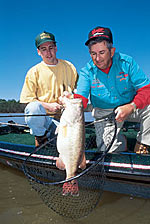
"Guys who are used to fishing alone from their boats can be thrown off mechanically when confined to the back deck. So they should get comfortable from the back of the boat.
"Fishing from the back of the boat is different. Casting angles are different, and you need to be able to use your wrists to overhand, underhand, and pitch baits at all angles.
"If a guy is not mechanically efficient from the back of the boat, he'll start taking chances, get hung up, and the frustration level from both ends of the boat gets pretty tense."
Kennedy said this problem could be avoided by practicing casting techniques and waiting until the boat moves into position so an accurate cast could be made to the cover.
According to Kennedy, backseat anglers can sometimes find themselves at an advantage when fishing with a power fishing partner.
"If the guy running the trolling motor is burning down the bank, then he's going to miss enough prime-casting targets that he can't turn back around and hit," he said. "This is when the non-boater can take advantage of missed opportunities. Be alert to where the other guy is casting, and if he misses a good cast, then it's your turn to make the most of it."
At the Weigh-in
Back at the ramp, it's helpful to have a discussion with your partner and recap how the day went, regardless of how many pounds and ounces were caught.
"You're probably going to fish with the guy again, and getting to know his quirks will help you get along better the next time," Kennedy said. "But most of all, recap what you learned that day and ask your partner where you can improve. This is fundamentally what club tournaments are all about. Learning from each other so you can enjoy the sport more and do better the next go around, armed with the confidence and experience you learned from fishing with an experienced angler."
The Next Weekend
Whether or not you have decided to use your boat or fish the next tournament as a non-boater, there is one other unwritten rule that, unfortunately, gets violated up to the pro ranks. But rookie tournament anglers can set the tone for their peers by following the ultimate rule of respect.
If you enjoyed a spectacular day of bass fishing with your boater partner, do yourselves a favor and avoid fishing at that exact location. When someone has shown you the extreme courtesy of taking you to his favorite bass water and requests that you not reveal its location to others, honor that request.
It is considered a breach of a sportsman's etiquette to return there without asking his permission first or to reveal the location to another angler.
"You're not only damaging relationships and being unsportsmanlike, but you are also doing yourself an injustice by not learning how to find your own fish. You're better off duplicating the pattern elsewhere, which you can do with experience.
"Someday, you'll be expected to set a good example, and respect is where it all begins," Kennedy said.
Reprinted with permission from


